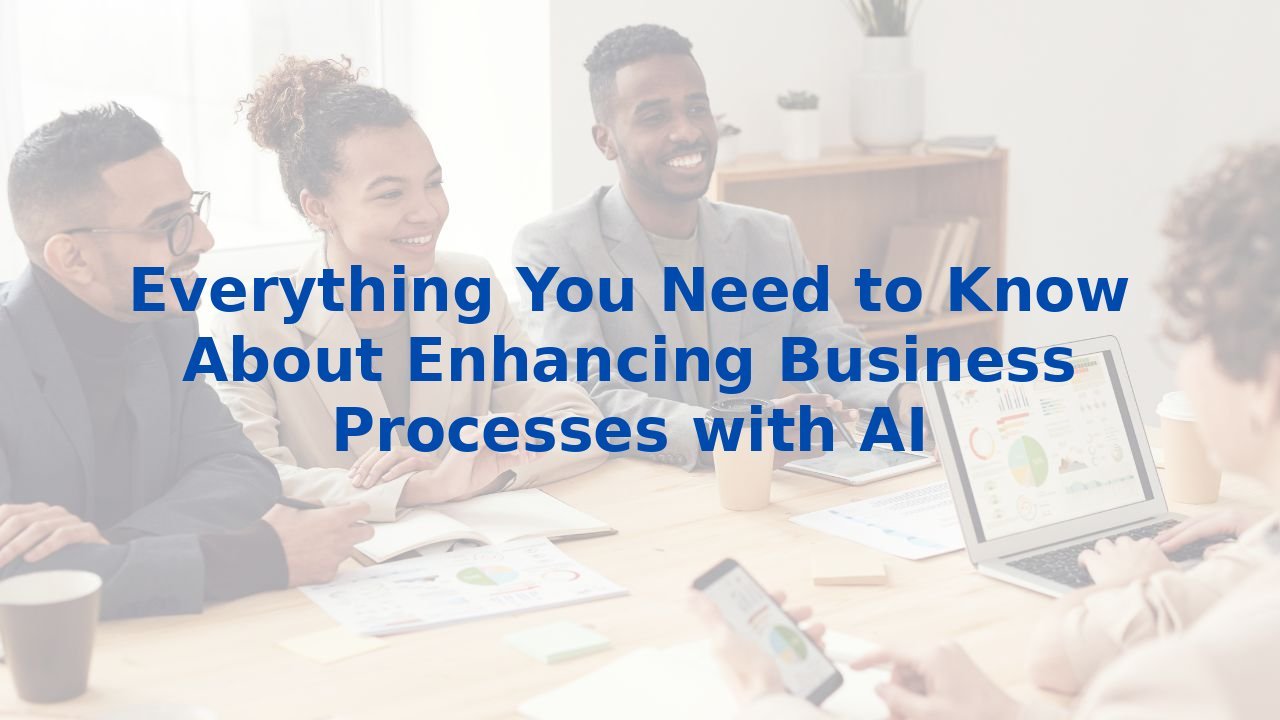Everything You Need To Know About Enhancing Business Processes with AI
Everything You Need To Know About Enhancing Business Processes with AI
In the relentless pursuit of efficiency, organizations must adapt and innovate to keep pace with an ever-evolving business landscape. Artificial Intelligence (AI) stands out as a keystone for enhancing business processes. It’s more than just a technological trend; it’s a catalyst for substantial organizational transformation. This blog post outlines how AI enhances various business processes—making operations smarter, faster, and more efficient—along with the critical role that employee training plays in this journey.
1. Process Discovery: Unveiling Hidden Efficiencies
Process discovery is where the magic begins. In traditional practices, uncovering inefficiencies requires tedious interviews and data crunching. However, AI offers a breakthrough by combing through extensive operational data at lightning speed. This approach, known as process mining, reveals hidden bottlenecks and inefficiencies that might otherwise go unnoticed.
“AI transforms data into insights, and insights into actionable strategies.”
By identifying patterns and workflows, AI provides a clear lens through which organizations can view their processes. This newfound visibility is invaluable, allowing decision-makers to optimize operations and eliminate redundancies. Organizations can ensure resources are allocated effectively and that every segment of the process is functioning at its best potential.
2. Process Mapping: Creating a Blueprint for Success
Once inefficiencies are identified, the next step is to map these processes visually. AI takes on this task effortlessly, translating complex data into user-friendly process maps. These maps capture how processes interconnect, highlighting areas where improvements can be made. The beauty of AI-generated maps lies in their adaptability; they can evolve alongside organizational needs, ensuring that all stakeholders remain aligned with the most current information. Continuous updates enable teams to react quickly to shifts in the market or internal performance metrics.
3. Process Automation: The Workhorse of Efficiency
One of AI’s most prominent advantages is its ability to automate routine tasks. From mundane data entry to complex customer service interactions, AI systems perform these activities with remarkable precision and speed. This automation liberates employees from tedious, repetitive tasks, allowing them to focus their energy on what truly matters: driving strategy and innovation.
While automation is a game-changer, it also calls for careful consideration. Striking a balance between AI and human involvement is fundamental. Organizations should strive to maintain a workplace where AI and humans work in concert, fueling creativity and problem-solving rather than fostering dependency.
4. Process Improvement: The Path Forward
With AI in place, the journey doesn’t stop at automation. Continuous improvement becomes a hallmark of success. AI facilitates ongoing feedback loops and provides data-driven insights for performance enhancement. By iterating on processes, organizations can maintain agility in a fast-paced market. This evolving approach ensures that business strategies remain relevant and attuned to both internal ambitions and external competition.
5. Benefits of AI in Business Process Management
Integrating AI into business processes yields various tangible benefits:
- Faster Results: Speed is the essence of AI. Rapid data analysis shortens decision-making timelines, enabling agile responses to emerging challenges.
- Enhanced Decision-Making: AI equips leaders with trend analysis and predictive insights, enhancing the quality of strategic decisions.
- Heightened Efficiency: By reducing manual tasks, AI enables organizations to redirect human resources toward more valuable, strategic initiatives.
- Real-Time Monitoring: Ongoing process monitoring ensures that businesses can quickly address issues as they arise, transforming challenges into opportunities.
6. Training Employees for AI: The Key to Success
To fully embrace the potential of AI, organizations must invest in employee training. Understanding AI’s capabilities and limitations is crucial for effective integration into daily workflows. Tailored training programs can equip employees with the necessary skills in data analysis and interpretation, creating a workforce capable of maximizing AI's benefits.
“Empowering employees with AI fluency is essential for lasting success.”
Moreover, training fosters adaptability. Employees who are prepared for change are more likely to embrace new processes, ensuring a smoother transition as businesses evolve. This proactive approach to change management not only mitigates resistance but also sparks a culture of continuous learning and improvement.
Conclusion
The integration of AI presents an unparalleled opportunity to enhance business processes. From optimizing discovery and mapping to refining automation and ongoing improvement, AI is poised to revolutionize how organizations operate. As the world changes, so must we, and training employees on AI integration is fundamental. By investing in both AI technology and the people behind it, organizations can navigate the future more deftly, ensuring sustained success and a competitive edge.



